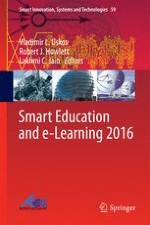2016 | OriginalPaper | Chapter
Use of Electronic Mind Maps for Creation of Flexible Educational Information Environments
Authors : Marina Mamontova, Boris Starichenko, Sergey Novoselov, Margarita Kusova
Published in: Smart Education and e-Learning 2016
Publisher: Springer International Publishing
Activate our intelligent search to find suitable subject content or patents.
Select sections of text to find matching patents with Artificial Intelligence. powered by
Select sections of text to find additional relevant content using AI-assisted search. powered by
